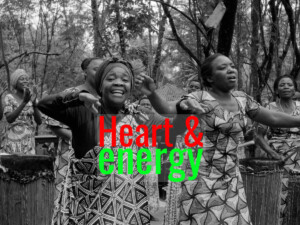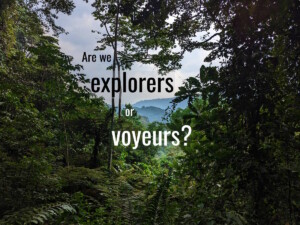Invisible changemaker: A pioneer of community-based tourism in Ethiopia
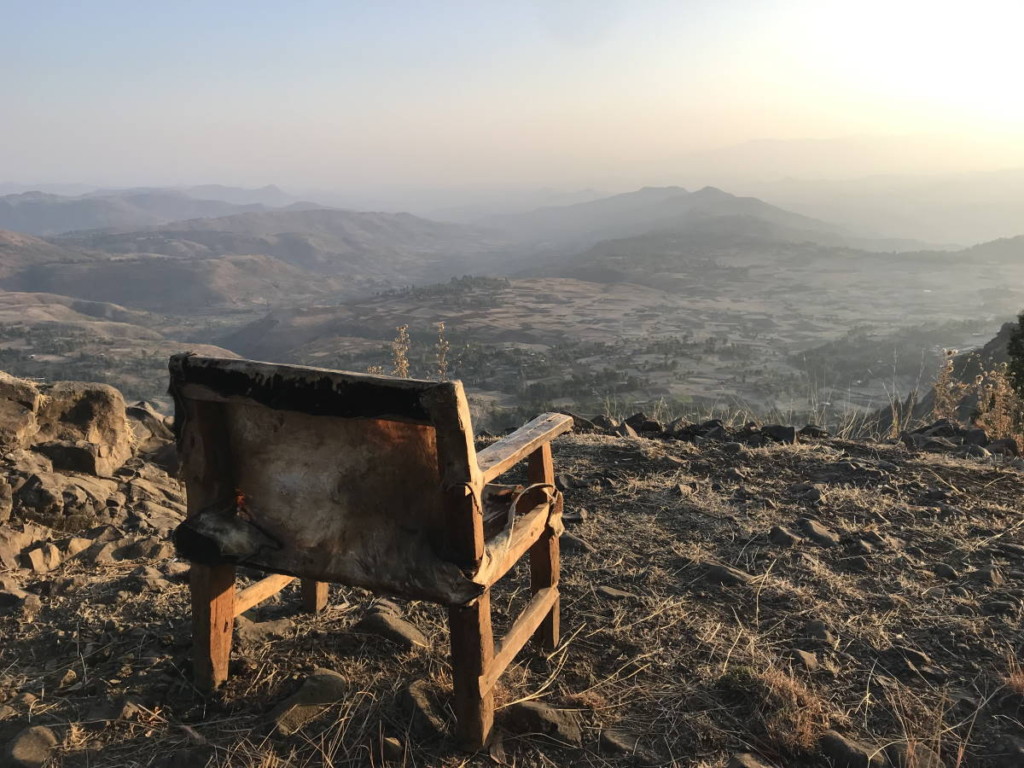
In the first of her ‘Invisible Changemaker’ interviews, Elisa Spampinato chats with Mark Chapman, a pioneer of community-based tourism in Ethiopia.
The “Good Tourism” Blog is proud to publish this interview series in collaboration with Elisa’s Traveller Storyteller, a “GT” Partner.
It’s a “GT” Insight Interview. [You can write a “GT” Insight.]
To start this series of interviews with the grassroots changemakers of our industry I have chosen a person whom I met very recently, during my last trip to Ethiopia.
To tell the truth, Mark Chapman’s reputation preceded him. The CEO and Founder of Tesfa Tours is someone I have wanted to meet since Tricia Barnett from Equality In Tourism told me about him in 2020, while I was planning that trip to Ethiopia.
Tricia referred to Mark as “someone you must get in touch with if you want to connect with local communities and community-based tourism in Ethiopia”.
Strangely, though, my meeting with him occurred thanks to one of those happy ‘coincidences’ that happen in my life. But that is a story for another time.
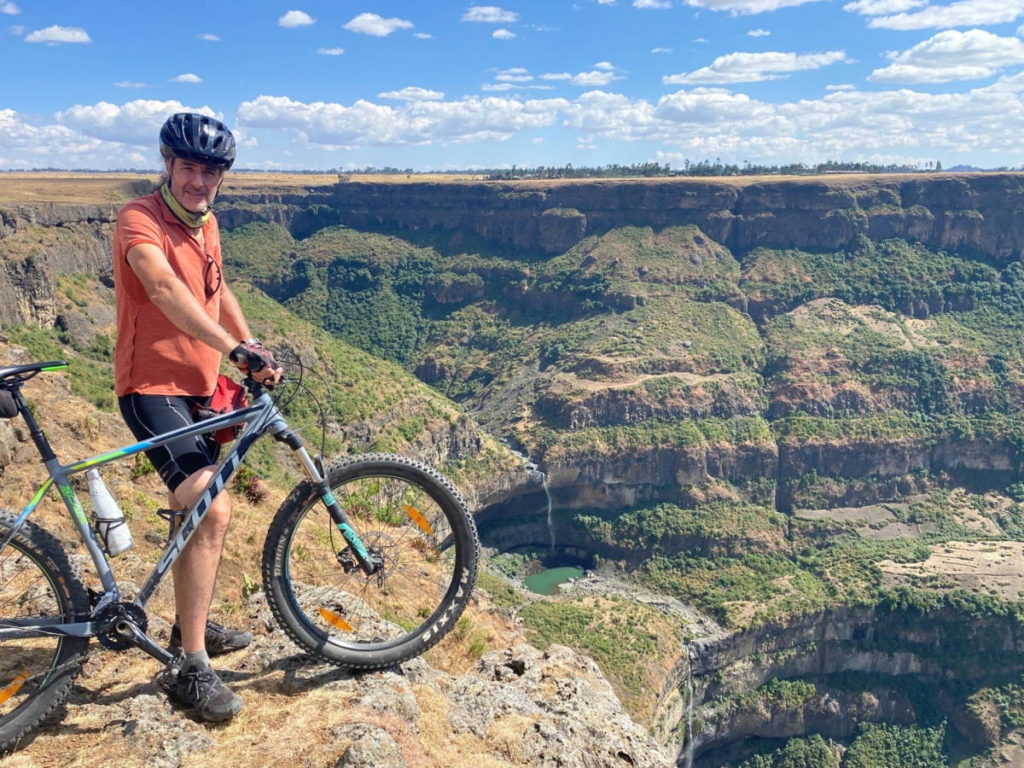
Mark Chapman is a real ground breaker; a person of influence in the history of community-based tourism (CBT) in Ethiopia, with a rich account of real positive impacts among many local communities in different regions across the country.
Mark organises trekking holidays in several ‘unexplored’ areas of Ethiopia.
Trekkers stop in local villages where they are hosted in community-owned guesthouses, which are structured as cooperatives.
Some 75% of the total income from these community-based tourism activities goes directly to the locals. With those revenues “they can protect their local environment, their societies, and their way of life,” Mark says.
I am glad to share here the report of my recent conversation with him.
Also read other “Good Tourism” Insight Interviews
Elisa Spampinato: What you started to offer in Ethiopia at the end of the 1990s was something really unique and innovative for the country, quite apart from the fact that tourism was not even properly developed at the time.
You told me once that the idea to create the foundation for community-based tourism in Ethiopia came from the desire to replicate your first personal and amazing experience in the country, as a backpacker in 1992, and make it available to other travellers.
Tell us how that initial experience marked you so strongly.
Mark Chapman: I believe that the thing that struck me the most was that the reality revealed to me during that trip was extremely different from my expectations.
Bob Geldof’s Live Aid was the soundtrack behind the dramatic images of the famine that struck Ethiopia so harshly in the 1980s. They remained the only images associated with the country in our minds in the West.
But I found a stunningly beautiful country, and the fact that I arrived during the rainy season only emphasised the impact it had on me. Everything was painted in a vivid green and I could only see lots of fruit and vegetables around me; plenty of food.
The human aspect was no less remarkable. I was embraced by this warm hospitality that just comes so naturally to the Ethiopians. And I met committed young people who loved their country and wanted to do something for it.
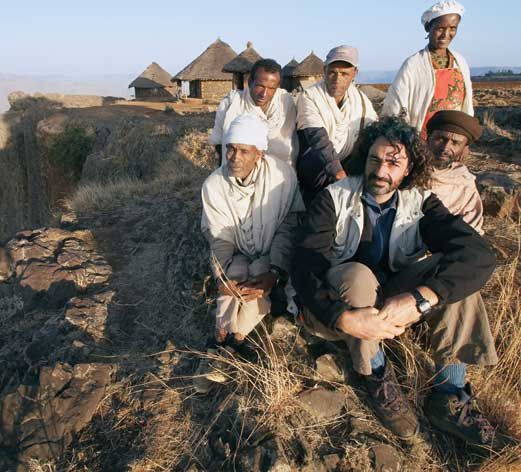
ES: How did you become the first person to talk about and, most importantly, implemented CBT in the country?
MC: After my hitchhiking trip across Ethiopia, in 1993 – 94 I got the chance to go back with a clear plan to work on tourism with local communities.
I developed a concept which I called ‘community-based tourism’ at the time because I felt it really should be owned by the local community; based in the community rather than following a paternalistic model where you involve the community but you run the thing and they just get a fee.
The NGO I was working with at the beginning was involved with community-based associations, which are essential parts of the traditional structure, such as the community funeral saving and supporting scheme, known most widely in Ethiopia as idir.
The NGO was really trying to work with the communities and integrate them in a multisectoral rural development project.
When I started my tourism project, I wanted it to follow the same ethos and logic. It was natural for me to combine ‘community-based’ with the word ‘tourism’ to make it ‘community-based tourism’.
I don’t think others were talking about CBT at that time; at least not in Ethiopia.
Don’t miss other content about “Good Tourism” in Africa
ES: What are the pillars of this kind of tourism that you built from scratch?
MC: I felt that one fundamental aspect of community-based tourism would be to build people’s capacity and their confidence.
If they could run a tourism business, interact with ferengis (the Ethiopian way of referring to foreigners), and earn an income, it would help them to do other things as well.
They could start running other businesses linked to that, improve their quality of life, but at their own rhythm and according to their own priorities.
Another central part of the project was that it would be a two-way process of communication between visitors and community members.
On one side, there are the visitors who can learn a lot about the things we have lost in our culture in the West, such as a close connection to the rhythms of nature and the richness of a simple life, and have the opportunity to get a healthy detox from the various kinds of pollution absorbed in modern societies.

On the other side, local farmers can build their capacity to run a business and learn a bit about the outside world. Consequently, they can appreciate even more what they have, by comparison.
In fact, the encounter can help locals realise that Western culture has lost many traditional references, and that there is an awful lot that is of great value in the way communities live and function in Ethiopia; that communities should hold on to that.
ES: Now, a big question about my favourite subject: change. What kind of changes have you observed in general while running Tesfa Tours?
MC: When I was trying to set my project up, a lot of people in the tourism industry were saying “we don’t believe that the local community and farmers can provide a service to tourists”.
On the contrary, I firmly believed that with the right level of training and support, and while keeping your objectives quite simple, it is possible for local communities to offer a service that tourists can enjoy.
You ask about changes, but I want to state that the first achievement was to realise that, yes, these farmers’ wives, daughters, and the farmers themselves can indeed offer a good level of service.
Also see other “GT” content tagged with “Community-based tourism”
ES: The next question has two parts, really, because there are two actors in this process. Firstly, how have tourists changed over the years?
MC: When we started at the end of the 1990s there weren’t many tourists aware of the possibility that you could do something like this. With time I have seen an increase in the number of people out there who are looking for a community experience.
Also, I think that people nowadays are a lot more concerned about the impact that tourism has. I observe that there is an increasing number of tourists who worry about the way they travel, either in terms of CO2 emissions and the means of transportation, or the hotel they choose to stay in while abroad. Interestingly, they often see CBT as a way to give back and balance that as well.
Of course, there are those who choose CBT because it is part of what they want to do when they are on holiday anyway. These are people that don’t just want a guided tour and stay in a fancy hotel; they want to get out there and see how life is in that country, and they see CBT as a great way to experience the local lifestyle.
I think that the segment of tourists requesting a CBT experience — that once was niche — is definitely growing, and I expect it to continue growing.
![Invisible changemaker: A pioneer of community-based tourism in Ethiopia 6 Ethiopian children "still run across the fields to come and talk to you [but] you’re not quite as mobbed as you used to be" _ Mark Chapman, founder of Tesfa Tours, Ethiopia](https://goodtourismblog.com/wp-content/uploads/2022/07/Ethiopian-children-still-run-across-the-fields-to-come-and-talk-to-you-1200-1024x768.jpg)
ES: The second part of the previous question, of course, refers to the local communities. Take, for example, the Wajela community, which I personally visited in April [2022]. What changes have you observed over the last twenty years?
MC: On the community side, taking as an example a place like Wajela, in the mountains south of Lalibela (Meket Woreda) where they have 20 years’ experience of tourists coming through, a lot has changed since the beginning.
The first time that tourists walked into the village, the whole community showed up to see them. After a year or so it calmed down, and even though they continue to greet people warmly, and kids still run across the fields to come and talk to you, you’re not quite as mobbed as you used to be (which is not at all a bad thing for the often surprised visitors).
These days you won’t get so many local people staying at the guesthouse, listening to the guests, and talking to them for hours. It is not such a new and exciting thing to do as it was. But still, there remains a fascination and interest in visitors.
Don’t miss other “Good Tourism” content about ‘storytelling’
I always remind clients that nobody has satellite TV and so the stories that hosts usually tell are generally local ones. But you will give them the most amazing stories. They are going to retell what happened the night that you visited and, for months and years to come, you will be part of the entertainment and their memories.
ES: Have you noticed any changes in the behaviour of women towards guests, in their own community, and in their attitude towards life, etc.?
MC: Yes, indeed, I have noticed some positive changes with the women too.
When I first started working with the Wajela community, for example, and went to talk to the women that were working at the guesthouse, they would not look me in the eyes or at my face. They let men answer for them.
This has completely changed now. I interact with the women, I talk to them, and they talk back to me.

A couple of weeks ago, returning to the Simien mountains after a long time having not visited, a young woman who is a cook ran down the hill to give me a big hug and tell me that I don’t look any older. (That was quite nice to hear.)
I don’t believe that these changes I am witnessing are a direct consequence of their active participation in CBT, but I think it must have helped.
Of course, we need to consider the changes that are happening on a bigger scale in society as well: Women’s education is slowly improving, girls are attending school more, and new concepts are permeating society. Women have more rights now than were recognised in the past; are treated more equally than before.
CBT is surely backing all of that up because women are now earning an income from it, which gives them a higher status within their own community.
ES: Thanks, Mark, for sharing part of your story with us!
For more information about Tesfa Tours please visit their website.
Featured image (top of post): Sunrise at Wajela community in Meket Woreda, North Wollo, Ethiopia. Photo © Elisa Spampinato.
About the author

Elisa Spampinato is a travel writer and community storyteller “dedicated to telling the untold stories of indigenous communities and local changemakers and unveiling sustainable and regenerative tourism practices at the grassroots level”. As Founder & CEO of TravellerStoryteller.com, Ms Spampinato “discovers ways to travel in a responsible way and to make tourism an opportunity for transformational encounters”.
Early in her career, Elisa worked with social projects and sustainable development programmes in Brazil, where she discovered the potential of tourism in the favelas of Rio de Janeiro. Today she collaborates with SMEs, local tour operators, and community-based tourism (CBT) projects around the world to enhance their digital presence and boost their communication and marketing skills.
Elisa believes in the power of storytelling: “We need to include more narratives in the picture”. This is why she designs and delivers tailor-made Community Storytelling Workshops to support local communities and their CBT projects in effectively sharing their stories with the world.
A Global Community-Based Tourism Ambassador for the Transformational Travel Council (TTC), an Associate for Equality in Tourism, and a Mentor/Mentee for Women in Travel CIC, Elisa is a “strenuous advocate for diversity, equality, and inclusion in the travel industry”.



